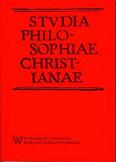Typy i funkcje refleksji w myśli tomistycznej
On the sources of cognition – types and functions of reflection in the light of Thomas Aquinas’s philosophy
Author(s): Joanna SośnickaSubject(s): History of Philosophy, Epistemology
Published by: Wydawnictwo Naukowe Uniwersytetu Kardynała Stefana Wyszyńskiego w Warszawie
Keywords: Aquinas; cognition; reflection; transcendence;immanence;
Summary/Abstract: In Modern Age, reflection was identified with the object of philosophical cognition. Epistemology took a significant part of metaphysical research and as a result, rationalism separated itself from realism, and realism from real existing beings. Different theories of cognition and of the object of cognition assumed internally consistent but quite distinct philosophical systems. In philosophy, the notion of reflection took peculiar meaning and even today it plays a significant role in the understanding of the object of cognition and experiencing a subject. Saint Thomas uses the nouns refelxio and reditio. The meaning of the Latin word reditio – “return move” underlines the natural dynamism of human cognition. A move fully realizes itself in the return move to its source, thus making a full circle: it starts with the contact of the cognizing object with the subject and finishes with experiencing object. The reflection is a movement, thanks to which one understands that he is able to cognize, and understands that he fully cognizes once he has cognized. The division into reflexio in actu exercito and reflexio in actu signato allows us to see the main functions of the reflection. Reflection binds consciousness with identity “I” that is human identity, and it gives it coherent, subjective sense, which structures itself by the cognition of external existing objects.
Journal: Studia Philosophiae Christianae
- Issue Year: 54/2018
- Issue No: 4
- Page Range: 71-88
- Page Count: 18
- Language: Polish

